What's New
Overview
We are always trying to improve the Palouse Mindfulness website and this page was created for those who would like to see what's changed since their last visit. All the changes since 2015 are given below, but you can see a short list of what has changed most recently by looking at the column to the left. by clicking on the arrow on the left-most part of the menu bar above.
Pages that are updated at least once a month are the Gallery of Learning and the Map of Graduates. A page that is fun to look at and changes moment to moment is the Map of Visitors.
-
—May 29, 2025 —
"False Dichotomy: Acceptance vs. Taking Action" [May 2025 Large-Group Meeting]
"Acceptance" is a term that is often misunderstood even in mindfulness circles. Here we're not talking about submitting to whatever is happening to you or others, but to recognize that what is happening is actually happening, and from the space that such a full recognition creates, an appropriate response can emerge. The response could be soft and gentle, but it could also be strong and forceful, depending on the situation. The Serenity prayer suggests that there are times when taking action is appropriate ("May I have the serenity to accept the things I cannot change, have the courage to change the things I can, and the wisdom to know the difference.").
There is a variation of this that Dave likes to call the Equanimity Prayer:May I have the presence of mind to accept that what is happening is actually happening,
the wisdom to know what kind of action is needed (including doing nothing),
and the courage to follow this wisdom.
-
— October 6, 2024 —
New website interface
We've completed a year-long redesign of the Palouse Mindfulness website: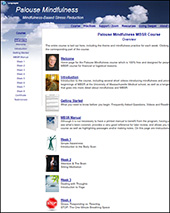
(1) Palouse Mindfulness is now more accessible for the blind or sight-impaired: Before the redesign, the Palouse Mindfulness course was completely unusable for someone who needs to use a screen-reader such as JAWS or NVDA or VoiceOver.
(2) We've given Palouse Mindfulness a "face-lift": The menus have been re-designed the menus in an effort to make navigation more intuitive and easier to use.
(3) We've created a new "Going Deeper" category which contains Graduate Explorations: This is a collection of 20 modules designed for graduates and others who want to deepen their knowledge about mindfulness topics beyond the 8-week MBSR course experience.
(4) We've added a new "About Us" category which highlights Our Team: Our team members are Palouse Mindfulness graduates who freely give their time and share their gifts in support of Palouse Mindfulness's mission to make mindfulness available to everyone, regardless of financial or geographical limitations.
-
— October 9, 2023 —
Inner Listening [September Graduate Meeting]
The most sophisticated and complete method I know of for turning toward our inner landscape is Inner Relationship Focusing, as taught by Ann Weiser Cornell. While a few elements of it are at the heart of Week 5's "Turning Toward" meditations, becoming completely comfortable and skilled with Focusing requires significant work and is beyond the scope of the MBSR course, this module provides a good introduction.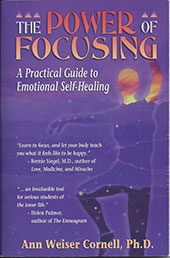
-
— September 1, 2023 —
Appreciation [August Graduate Meeting]
Often, we don’t tell people what we love and appreciate about them, maybe because we think that, of course, they know – they don’t need to be told – or because we worry that they might think it’s phony or done with ulterior motives. And on the flip side, when we are given genuine appreciation by others, we often don’t receive it well, deflecting it or diminishing it when all that was needed is a simple, “thank you”. Included in the meeting was the story, "All the Good Things", a poignant and inspiring story about the magic and power of appreciation.
-
— August 9, 2023 —
"Looking Good" [July Graduate Meeting]
You've probably heard the Leonard Cohen quote: “Forget your perfect offering. There is a crack in everything. That's how the light gets in". Most of us that we all want to hide our imperfections and "look good", but at its extreme is a quest for perfectionism that is so pervasive in the west that it's practically a cultural trait. Brené Brown, in the short video saw at this meeting, calls our striving to “Look Good” the “20-ton shield that we carry around to protect us from being hurt, but what it does is keep us from being seen”. This page includes the videos and readings from both this in-person meeting as well as the monthly zoom meeting held the Saturday after the in-person meeting, in which we addressed the same topic.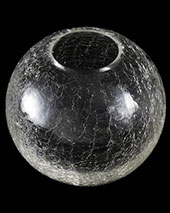
-
— July 9, 2021 —
Italian version of Palouse Mindfulness
The Italian version of the Palouse Mindfulness course is complete! This effort took over six years and included 140 separate translations, including web pages, articles, worksheets, video subtitles, and audio meditations recorded in Italian. Most translations involved a primary translator and at least one reviewer and we estimate that over 180,000 words (the equivalent of a 600-page book) were translated! A big "Thank you" to the 21 Palouse Mindfulness graduates who generously assisted in this effort, and a very special thanks to Julia Clancy and Alessandra Volpi of the Francesca Centre for initiating this effort and for doing most of the translations. The Italian version is accessible through the Italian flag you see in the upper-left corner of any Palouse Mindfulness page.
-
— June 30, 2023 —
Preferences vs. Demands [June Graduate Meeting]
After not having our monthly in-person graduate meetings for three years due to the pandemic, we have begun meeting again. Joko Beck, in “Nothing Special”, says there are two kinds of desires: preferences and demands. She says there’s nothing wrong with preferences – the problem is when our preferences become demands we make of life. This page includes the videos and readings from both this in-person meeting as well as the monthly zoom meeting held the Saturday after the in-person meeting, in which we addressed the same topic.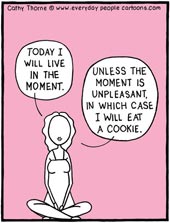
-
— May 5, 2023 —
JKZ Meditations (Jon Kabat-Zinn App)
In collaboration with the Swedish company, Mindfulness Apps, Jon Kabat-Zinn has made his meditations available through a smartphone app called JKZ Meditations. This app features dozens of his meditations, of various lengths, some as short as 3 minutes, as well as his original 45-minute Body Scan and Sitting Meditations. It is a fee-based app, but only $2.98/month to cover administration costs. Subscribers are invited to live zoom sessions with Jon, held via zoom every 2 months, which include a meditation and Q&A.
-
— February 5, 2023 —
New research validating MBSR
JAMA Psychiatry has just published research definitively showing MBSR is as effective as Lexapro for treating anxiety. Although there are hundreds of studies that address the effectiveness of MBSR, there is criticism that many of them either don’t include enough subjects or aren’t rigorous enough. This study included 276 adults diagnosed with untreated anxiety disorders. One group received a standard beginning dose of Lexapro and the other took an 8-week MBSR course. Both groups were evaluated at the end of eight weeks and both showed 20% reduction in the severity of their symptoms. We've added this paper to the Scientific Research page of Palouse Mindfulness.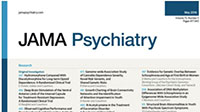
-
— June 19, 2022 —
MBSR Research
We have completely updated the Research page. Previously, the studies referenced were from the early days of MBSR, as far back as the 1980s, and the new Research page highlights the very latest research, including recent meta-analyses, as well as sections on Anxiety, Cancer, Chronic Pain, Diabetes, Fibromyalgia, Heart Disease, Irritable Bowel Syndrome, Migraine Headache, Multiple Sclerosis, Respiratory Disorders, Smoking Cessation, and Quality of Life. A deep bow of gratitude to Palouse graduate Joanne Noone who spent many hours bringing our research summaries and citations fully into the 21st century.
-
— December 8, 2021 —
Portuguese version of Palouse Mindfulness
The Portuguese version of the Palouse Mindfulness course is complete! This effort took over three years and included 160 separate translations, including web pages, articles, worksheets, video subtitles, and new audio meditations recorded in Portuguese. Most translations involved a primary translator and at least one reviewer and we estimate that over 180,000 words were translated! The 13 Palouse Mindfulness graduates who generously assisted in this effort are native speakers of Portuguese from Brazil or Portugal. All of the translation was done directly from the English and not through automatic translation tools, helping to ensure that the translation faithfully communicates the principles of mindfulness.
-
— October 12, 2021 —
Walking Meditation
The Walking Meditation is an important practice, a key component of many meditation retreats, and until now, this meditation wasn't part of the Palouse Mindfulnes course. We are happy to includeTara Brach's wonderful guided introduction to Walking Meditation as well as her written instructions. The Walking Meditation is now a formal part of the Palouse Mindfulness course and is introduced in Week 7.
-
— October 9, 2021 —
Free live one-day retreat for new Palouse Mindfulness graduates!
Thanks to the generosity of Mindful Leader, and through a special collaboration with Palouse Mindfulness, new graduates of the Palouse Mindfulness course are now able to participate in a live one-day online retreat, led by a certified MBSR instructor, at no cost. Anyone completing the Palouse Mindfulness course and submitting the materials indicated in Requesting a Certificate will receive a coupon entitling them to a free one-day MBSR retreat that includes participants from Mindful Leader's live MBSR courses as well as other Palouse Mindfulness graduates.
-
— July 2, 2021 —
Weekly Online Meditation & Discussion Meetings!
We now have regular live online zoom meetings, providing a way for Palouse Mindfulness students and graduates to share with each other and deepen their practice. Each of these meetings is hosted by an experienced Palouse Mindfulness graduate and include a meditation as well as time for sharing and discussion. For Palouse Mindfulness students, one of the six formal practices for a given "week" can be one of the live group meditations listed here, providing a way for a student to have a regular weekly group to meet with while they take the course.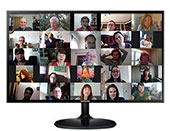
NOTE: The horizontal menu has changed to make room for this new "Online Meetings" page. "Quotes" is now accessible via an icon on the far right and "Testimonials" has been moved from the horizontal menu to the left-hand menu.
-
— April 29, 2021 —
Using STOP - Interview of Dave Potter by Yurika Vu (added to Week 4)
In September of 2020, I had a wonderful conversation with Yurika Vu that was recorded as a module for a Parenting Summit that she hosted via Zoom. This segment was part of that conversation. Here is a link to the entire 34-minute interview. This was added to Week 4 and the Robert Zapolsky video was shortened to accommodate it.
-
— November 9, 2020 —
Zoom Meetings for Graduates and Students
In April we began meeting via Zoom rather than in person. Palouse Mindfulness students who are part of the Palouse Mindfulness Community are invited as well and participants are from all over the world. Recordings of some of these meetings, starting with the May meeting are available here . The introduction, group meditation, and those portions of the Q&A for which we have permission are recorded (small-group discussions are not recorded).
-
— October 27, 2020 —
Russian version of Palouse Mindfulness
The Russian version of the Palouse Mindfulness course is now live! (see the Russian flag in the upper left corner) This effort took three years and involved 138 separate translations, including web pages, articles, worksheets, video subtitles, and new audio meditations recorded in Russian - a total of about 180,000 words! This was not a product of Google-translate, but the careful work of eight Palouse Mindfulness graduates from Russia, led by Natasha Fedunina, who did more than 90% of the translations, and assisted by Oxana Laskovski-Zabaznovski, who, in addition to helping with translations, recorded all of the meditations in Russian.
-
— August 23, 2020 —
"Mindfulness and the Body" - new video by Michelle Maldonado (Week 1)
In this new video for Week 1, Michelle Maldonado talks about how deeply intertwined the body, mind, and emotion are. In order to make room for this video, the Raisin Meditation was moved to be a formal part of the other course meditations and assigned as the meditation to be done on the first day of Week 1.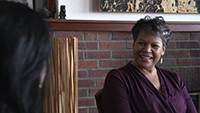
"Holding Your Feelings Like a Baby" - new video by Thupten Jinpa (Week 5)
This is a short but powerful video by the Dalai Lama's interpreter, Thupten Jinpa. In this 2-minute video, he describes the importance of paying attention to difficult feelings, but in a gentle way, holding them "like a baby." To make room for this video, Steven Hayes' "Mindfulness and Painful Emotions" was moved to the supplementary section.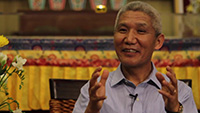
"How Stress Affects Your Brain" - new video by Madhumita Murgia (Week 4)
This short animated video is a wonderfully concise yet accurate description of the effects stress can have on the brain. It is a very balanced portrayal of stress, emphasizing that while chronic stress can be harmful, a certain amount of stress is often helpful, for instance, when we need extra energy in response to a critical event..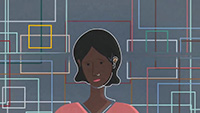
-
— August 22, 2020 —
"Mindfulness Practice" - new video by Michelle Maldonado (Week 2)
In this video about mindfulness practice, Michelle gives a beautiful definition of mindfulness: "To be fully present in the moment to the mind, body, and surroundings, with curiosity and kindness". This replaces "Measuring Mindfulness" by Judson Brewer, which is now in the supplementary section.
"Whodunnit" - new video by Shamash Alidina (Week 2 supplementary)
Even a master meditator with thousands of hours of practice would miss most of the changes in "Whodunnit". This example illustrates both the incredible power of attention and the inherent limitations in our ability to perceive fully what is going on around us.
-
— August 20, 2020 —
"Love Letters" - new video by Kaira Jewel Lingo (Week 8)
This is a powerful message about Gratitude and about treating everyone, even those with opposing views, with compassion. Kaira Jewel is an ordained nun of 15 years in Thich Nhat Hanh's "Order of Interbeing" and now teaches meditation, mindfulness, and compassion internationally, with a focus on activists, people of color, artists, educators, families, and youth.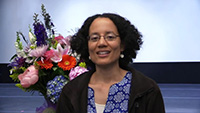
-
— August 19, 2020 —
"Self-Love" Interview of Dave by Yurika Vu
Yurika Vu interviewed me as part of her one-day "Self-Love" retreat in May. Yurika is a wonderful interviewer: knowledgeable, intelligent, and curious. As has been my experience before with her, she brought out things that I don't think I've said quite the same way anywhere else. This was added to the Supplementary section of Week 7. Also, Tara Brach's 2-minute Radical Acceptance is a Prerequisite for change was added to the main videos of Week 7.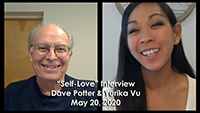
-
— April 18, 2020 —
The "Felt Sense" Prayer
This is a beautiful short prayer/poem about the relationship we have with those difficult things we want to be rid of, from headaches and knots in our stomach to grief or chronic medical conditions. We normally devote great energy to rid ourselves of them, but there is a magic in "turning toward" them in a special way. This has been added to both Week 5 and to the graduate meeting notes titled "Inner Listening", which is devoted to Focusing and the "Felt Sense".
-
— March 17, 2020 —
Mindful LIfe Summit interview of Dave by Yurika Vu
This is a video from the Mindful Life Summit that Yurika Vu organized in February. In it, Yurika and I talked about a variety of topics, including dealing with difficult emotions mindfully and what we can do in the moment when those feelings arise.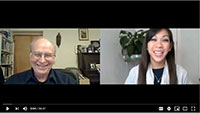
-
— February 16, 2020 —
On Grief and Loss [February Graduate Meeting]
There is nothing easy about the death of a loved one, or about any major loss, and the paradox is that great loss often produces great openings. If you look at nothing else from this month's graduate notes, be sure to watch the interview of Stephen Colbert with Anderson Cooper in which they talk about their own experiences with grief. Colbert, talking about losing his father and two brothers in a plane crash when he was 10, tells Anderson, "I learned to love the thing that I most wish had not happened." Anderson gets very curious about this and what follows is a wonderful exploration of grief and the ways in which great loss often brings with it great gifts. You can find the link to the interview and the other videos shown at the meeting by clicking on "On Grief and Loss", above.
-
— December 22, 2019 —
Interview of Dave Potter by Jeanine van Seenus
This is a podcast interview of me by Jeanine van Seenus, a Munich-based life coach and speaker who does a series of YouTube podcasts called "Global Women Empowerment". We talked about a range of topics, including how to deal with self-critical thoughts, anger, and forgiveness.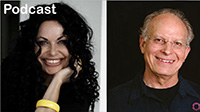
-
— December 6, 2019 —
Deep Listening by Frank Ostaseski (New Week 6 video)
In this short but powerful video,Frank Ostaseski, founder of the San Francisco Zen Hospice, suggests listening not just from our head and ears, but also from our heart and body. To accommodate this addition, Susan Piver's video has been shortened.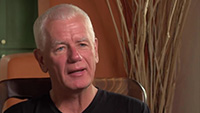
-
— November 1, 2019 —
All Bodies are Beautiful (New Week 1 video)
This 4-minute video chronicles the surprising thing Amy Pence-Brown, a self-described “body-image activist”, did in a busy public market in downtown Boise, Idaho, and the heart-warming response that resulted. If you are moved by this video, see also her blog describing the back-story to this event and Amy's TEDx talk. This has been added to the videos for Week 1, following Jon Kabat-Zinn's "Befriending our Bodies".
-
— October 31, 2019 —
Self-Compassion [October 2019 Graduate Meeting]
Our most important relationship is our relationship with ourselves, yet we are often unkind to ourselves in subtle and not-so-subtle ways, such as critical self-talk, in which we talk to ourselves in ways we would never talk to someone we care about. At the heart of our lack of compassion for ourselves is the lie that many of us grew up with: in order to be successful, we must not only work hard, but we must never be satisfied, always push harder. As Emma Seppala says: "Strive for more, work even harder, aim to be the best! We live in a society that regularly sends us such messages".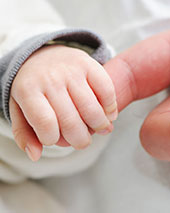
If you watch nothing else from this month's videos, be sure to see the 4-minute clip, Stand for Self-Love to see Amy Pence-Brown, a self-proclaimed "body-image activist" doing a surprising thing in a public market in downtown Boise, Idaho.
-
— October 28, 2019 —
Video interview of Dave Potter by Beverly Buncher
Beverly Buncher of BALM Family Recovery interviewed me on October 23rd. We talked about how MBSR can be instrumental in developing a warm and compassionate relationship with ourselves in the context of dealing with a loved one who is struggling with alcohol or drugs. BALM stands for “Be A Loving Mirror”, which means reflecting accurately what we see in ourselves and others in loving way, even when what we see is difficult.
Beverly's online program has mindfulness as a core component and provides powerful tools and resources for families dealing with alcohol and drug abuse. The program is designed to support both the family and the struggling loved one, providing an innovative way to maintain an open, loving heart, while at the same time holding firm boundaries.
-
— August 31, 2019 —
Acceptance / Non-Striving [August 2019 Graduate Meeting]
At this month's graduate meeting, we showed a video by Tara Brach, Hands Off the Controls. The point of Tara's videos is not that we should always have our "hands off the controls", but that there are times it feels like we should be taking control when the most effective strategy might be letting go. But, there are other times when taking action is necessary, such as when we need to protect ourselves or someone else. What does "Acceptance" or "non-striving” mean in these cases?
-
— July 31, 2019 —
Happiness [July 2019 Graduate Meeting]
Thinking there is some external event that is going to make us happy is, in itself, an obstacle to true happiness (maybe a better word for what we’re seeking is life-satisfaction or well-being). In the video shown at this meeting, Matthieu Ricard says that we confuse happiness with pleasure, and that any pleasurable experience extended indefinitely soon becomes unpleasant, and true satisfaction in life comes not through events or things but through our relationship with ourselves and with others. In one of the supplementary videos, Matt Killingsworth describes a fascinating research study he did which suggests that our level of reported happiness is directly related to the degree we are in the present moment, regardless of the type of activity we may be involved in.
-
— June 20, 2019 —
The Dark Pieces [June 2019 Graduate Meeting]
The title of this month's graduate meeting was inspired by Rachel Naomi Remen's story, The Dark Pieces, from her book "Kitchen Table Wisdom". We all have aspects of ourselves or our circumstances that we don't like. John Tarrant of Pacific Zen Institute says:
"We often disapprove of parts of our lives without really examining them - it's like never going into certain rooms of your house. But meditation allows all the voices and all the images in the room. When we open the invisible doors, we can come to rest in the life we have; we can love it as it is instead of waiting for a shinier version."
-
— May 23, 2016 —
Telling the Truth [May 2019 Graduate Meeting]
In the video we showed at this meeting,Tara Brach suggests that if we had no other practice than bringing mindfulness into conversation, that it would transform our lives. Sylvia Boorstein says: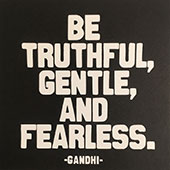
"I believe we are obliged to tell the truth. Telling the truth is a way we take care of people. The Buddha taught complete honesty, with the extra instruction that everything a person says should be truthful and helpful... When I tell people those criteria, they often exclaim, 'But then no one could ever admonish anyone!' I think otherwise. I think with Right Speech people can make suggestions or observations in a way that the other person can hear and see them without feeling diminished."
-
— April 28, 2019 —
Emotional Courage [April 2019 Graduate Meeting]
There are the obvious examples of courage, such as the soldier who runs into live fire to rescue his buddy, or the subway bystander who jumps down onto the tracks to save a child who has fallen from the platform. All of us would like to think we’d show the same type of selfless action if we were in a similar circumstance, but most of us will never find out. While we aren’t confronted with life and death situations very often, Brené Brown, a research professor at University of Houston who specializes in the study of vulnerability and courage, believes that at the heart of courage is the willingness to be vulnerable, including being willing “…to ask for what you need… to talk about how you’re feeling… to have the hard conversations.” It takes courage to tell a friend or loved one a hard truth, or to admit that you made a serious mistake, or to speak up for what you think is right even when you think you stand alone..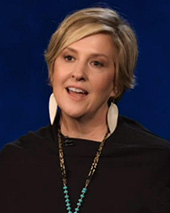
-
— March 31, 2019 —
The Importance of Practice [March 2019 Graduate Meeting]
There are so many questions one could ask about practice: What does it mean to “practice” mindfulness? Is it necessary to practice in a formal way, such as sitting meditation or yoga? If one is going to have a formal practice, then how long and how often? Or is it enough to let the practice opportunities come spontaneously, such as remembering to pause (STOP) at a tense moment, or fully experiencing your surroundings in the middle of a busy day? These are not questions anyone else can answer for us – each of us must find our own way to renew or maintain mindfulness in our lives, one that resonates with who we are. This is a continual journey, one that is a practice in itself.
-
— February 28, 2019 —
Belonging / Wholeness [February 2019 Graduate Meeting]
Our topic for this meeting was Belonging/Wholeness. In one of the videos shown at this meeting, Tara Brach suggests that what is often the most important thing near life's end, feeling connected to others, is also the most important thing during the whole of our lives, but that we sometimes forget that. She says that "the treasure we seek is closer than we imagined", and that "it's in the field of relationship that the magic happens".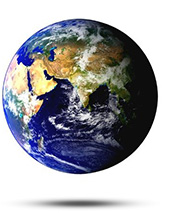
-
— January 20, 2019 —
"Be Kind. Always." [January 2019 Graduate Meeting]
January's graduate meeting was about kindness and compassion. In one of the videos shown at this meeting, mindfulness teacher Jamie Derrick talks about her personal guideline, "Be Kind. Always.", which has been central to her life for many years. This is not a "wimpy-walk-on-me" kindness but a strong, "say-what-needs-to-be-said" kindness. Being kind does not necessarily mean backing down when a hard truth needs to be told or when we need to protect ourselves. Jamie reminds us that kindness is possible in any circumstance when intelligence and wisdom are applied.
-
— December 27, 2018 —
The Samurai and the Fly An animated short created by Hanjin Song
This wonderful animated video has been added to Week 3 ("Dealing with Thoughts"). It is a vivid dramatization illustrating how trying to stop thoughts or push away distractions not only doesn't work, it actually makes things worse.
-
— December 18, 2018 —
"Blame" and "Empathy" Two animated shorts narrated by Brené Brown
When dealing with conflict, blame is easy and empathy difficult, so it's perfect that we have these two powerful animated shorts narrated by Brené Brown. They have been added to Week 6 and are drawn from her 21-minute talk, "The Power Vulnerability" that went viral in 2011.
-
— November 15, 2018 —
The Illusion of "Self" [November 2018 Graduate Meeting]
This month's discussion was not about proving or disproving whether you have a “self”. This is a futile enough exercise that even the Buddha is said to have gone silent when asked the question directly. The discussion is centered around considering that you may be much more than you thought, much more fluid, much less limited, but that this “who” that you really are may not be limited to your individual body or mind, that in some very fundamental way, we are truly not at all separate from anyone else or anything else. Einstein called it a delusion of consciousness. In the Jack Kornfield video, Sanctuary, he says that we need to recognize both our larger self, which has no boundaries, and our more conventional individual self, and forgetting either one is problematic.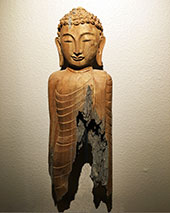
-
— October 19, 2018 —
Preferences vs. Demands [October 2018 Graduate Meeting]
Our topic for this meeting was “Preferences vs. Demands”. Joko Beck, in Nothing Special, says, "preferences are harmless; we can have as many as we want. Desire that demands to be satisfied is the problem." A demand puts us at war with our own experience, making the present uncomfortable at best, and unbearable at worst. We spend much of our waking hours wanting life to be different than it is, anticipating pleasure or pain, all the while missing what's right in front of us. James Baraz says: "Mindfulness is simply being aware of what is happening right now without wishing it were different; enjoying the pleasant without holding on when it changes (which it will); being with the unpleasant without fearing it will always be this way (which it won't)."
-
— June 15, 2018 —
Original Goodness [June 2018 Graduate Meeting notes]
Included in the June Graduate meeting notes is a wonderful Jack Kornfield story about the Wat Traimit Buddha in Thailand. For hundreds of years, It was thought to be made out of clay before it was discovered in 1955 that underneath a surface layer of plaster was a stunningly beautiful statue made of solid gold, some five tons in weight and worth more than $250 million (see photo to the left). Jack uses this as a metaphor to illustrate the idea that every human being, without exception, has an inner core of "original goodness", ever-present, pure and intact, but obscured by habits and behaviors born out of self-protection and ignorance. The 16-minute video shown at this meeting, Trusting Your Basic Goodness, builds on this theme. The video is excerpted from a longer talk Tara Brach gave in 2013.
-
— May 6, 2018 —
Wheelchair Yoga routines
A new playlist has been added to Yoga 1 & Yoga 2 as an option for people with injuries or disabilities. Included in the playlist are 12-minute, 17-minute, and 30-minute routines, as well as a series of much shorter routines that can be combined to create a custom 20-30 minute yoga session to substitute for either Yoga 1 or Yoga 2.
-
— April 30, 2018 —
Altruism / Moral Courage Readings for the July 9 Graduate Meeting
The 18-minute video of Matthieu Ricard, Cultivating Altruism, was shown at the July graduate meeting. We also discussed the article, We Are All Bystanders, which explores the "bystander effect" - why some people step forward to help someone in distress and some don't. This and other readings were added to Graduate Explorations.
-
— April 22, 2018 —
New Week 5 (Weeks 5 and 5b combined)
Week 5 (Dealing with Difficult Emotions) and Week 5b (Special Instructions for Physical Pain) have been combined. I've created a new informal practice, "Turning Toward", which integrates elements of RAIN, Soften-Soothe-Allow, and the Week 5b PAIN process, as well as two new meditations, Turning Toward Difficult Emotions and Turning Toward Physical Pain. A number of new videos and readings have also been introduced (see below).
New Videos for Week 5
In One Moment at a Time, Vidyamala Burch describes a dramatic moment in the hospital with decades-old chronic pain that changed the course of her life, and began her life work in teaching how to use mindfulness to deal with chronic pain. Pain x Resistance = Suffering is a wonderful new video by Tara Brach about this often-referenced mindfulness formula. Mindfulness and Painful Emotions is a short but provocative video by Steven Hayes, creator of ACT (Acceptance and Commitment Therapy) suggesting that trying to make difficult emotions go away not only doesn't work, but makes things worse.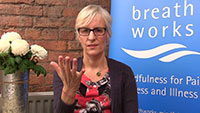
-
— March 4, 2018 —
Gratitude, 365 Grateful Project, and Grand Central Station (New Week 8 videos)
Gratitude, a stunningly beautiful video by Louie Schwartzberg, includes narration by Benedictine monk David Steindl-Rast, and in The 365 Grateful Project, Hailey Bartholomew describes her inspiring journey of finding something to be grateful for every single day. Also added was a wonderful short video by Sharon Salzberg about cultivating lovingkindness in the most ordinary of places, called Grand Central Station. "Happiness is Not a Crystal Ball" and Tara Brach's "Happiness" were moved to the Supplementary section.
-
— February 24, 2018 —
Listening as an Act of Love (New Week 8 video) - video by Jon Kabat-Zinn
This video replaces Jon's "Compassion and Mindfulness" video, which was moved to the "Supplementary" list for Week 7. In this new video, Jon says: "If listening isn't a compassionate practice, I don't know what is... Just being present and being there for the other, and [simply] hearing, so that we're not thinking and judging and evaluating what the person is saying, but it's going straight to the heart...".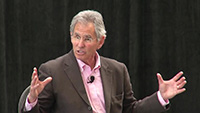
-
— February 23, 2018 —
Your Thoughts are Bubbles (New Week 3 video) - video by Jon Kabat-Zinn
Jon Kabat-Zinn talks about the idea that meditation is not about getting rid of thoughts, but about changing our relationship to them. To make room for this video, Tara Brach's Surrender to the Monkeys, has been moved to "Supplementary Materials". A great new Tara Brach video, Thoughts: "Real, but not True", has been added to the Supplementary section.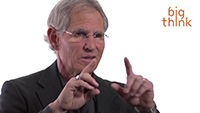
Evolutionary Roots of Compassion (New Week 7 video)- video by Dacher Keltner
This video, by Dacher Keltner of U.C., Berkeley, provides evidence for the idea that we, as humans, have a deep-seated inclination to care for others. It replaces the previous one by the same name, which was low-resolution and somewhat dated. In addition to the video being of better quality, this version has more graphics as well as some new material.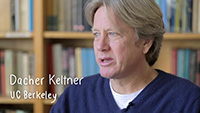
-
— December 22, 2017 —
On Loss and Death [December 2017 Graduate Meeting]
There is nothing easy about the death of a loved one, or about any major loss, and the paradox is that great loss often precedes great openings. In The Five Invitations, the video shown at this meeting, Frank Ostaseski, founder of San Francisco Zen Hospice, writes about his many years of hospice work, and gives an introduction to the five invitations and to the book by the same name. In the "Loss and Death" meeting notes is also a link to a wonderful talk by Tara Brach, Darkness of the Womb: 4 Steps to Transforming Suffering.
-
— December 4, 2017 —
Welcome to Palouse Mindfulness - video by Dave Potter
This short welcome video is now the first thing that someone coming to the Palouse Mindfulness site sees. Many people have a hard time believing that the course is really, truly, free, and in addition to welcoming new visitors, this message describes how such a rich and complete course came to be totally free and available to anyone who wishes to learn mindfulness, regardless of location or financial resources.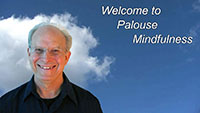
-
— September 23, 2017 —
Ten Mindful Movements video by Plum Village and Thich Nhat Hanh
This ten-movement sequence is done by residents of Thich Nhat Hanh’s Plum Village every day and is included in the Palouse Mindfulness course as a gentle alternative to the yoga sequences that are part of weeks 3 and 4. This replaces a low-resolution version that was previously on the site. It is twice as long as the original, making it roughly the same length as the yoga videos used. In this version, the sequence is demonstrated twice, first by a student of Thich Nhat Hanh, and then by Thich Nhat Hanh himself.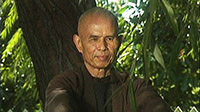
-
— August 17, 2017 —
Forgiveness [August 2017 Graduate Meeting]
At its heart, forgiveness is a function of deeply understanding our inter-connectedness, the impossibility of assigning ultimate cause, a recognition of the fact that those who are abusive to others are often themselves victims of abuse. Henry Wadsworth Longfellow said: "If we could read the secret history of our enemies, we should find in each man's life sorrow and suffering enough to disarm all hostility." The video for this month was Unconditional Love, a 2014 talk by Tara Brach.
-
— May 9, 2017 —
Joshua Bell plays a $3,000,000 violin (and almost nobody notices) - new document
The Joshua Bell story has always been part of Week 2, but this document was written to make the point that the fact that so few people stopped was not a demonstration of the cluelessness of the commuters who paid no attention to a world-class musician who normally commands $75,000 per performance, but how the busyness of our daily life can sometimes prevent us from noticing the beautiful and miraculous things that are always happening around us. The document also provides a link to the original Washington Post article, written by Gene Weingarten, who organized this social experiment. Weingarten's article includes some video clips of this remarkable "concert".
-
— April 30, 2017 —
Raisin Meditation - video by Dave Potter
This new raisin meditation, which follows more closely the raisin meditation done in my in-person classes, replaces the Bob Stahl video that was in Week 1. Because it's longer than the video it replaced, Jon Kabat Zinn's "Life is Right Now" video was moved to Week 2, where it replaces the video commentary by JJ Musgrove about Joshua Bell, which many viewers pointed out was unfairly judgmental of the Washington, DC commuters who didn't stop and listen (see May 9th entry above).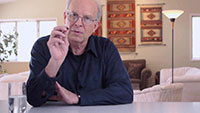
-
— April 5, 2017 —
The Power of Mindfulness - What You Practice Grows Stronger - video by Shauna Shapiro
This new video by Shauna Shapiro was added to Week 1. In it, Shauna emphasizes the importance, not of just paying attention to our inner experience, but paying attention with kindness. It replaces the "60 Minutes" video which is no longer available from CBS. Another great video that was added to Week 1 is Don't Try to be Mindful by Daron Larson, which addresses the common misunderstanding about meditation that if we are not experiencing peace and calm, then there must be something wrong with how we are practicing.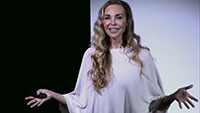
-
— March 15, 2017 —
Awakening in Times of Social/Political Unrest [March 2017 Graduate Meeting]
This meeting was dedicated to the trying times we are in both socially and politically. It’s important in times like these that we don’t put those who think differently than we do out of our hearts. This is challenging. On the one hand, we want to be true to our own values and beliefs, which may mean taking a strong stand and acting decisively, but on the other hand, we want to be careful that we aren't creating even more division by being intolerant and rigid ourselves. In the 26-minute video shown at this meeting, Awakening Consciousness in Shadowy Times, Tara Brach talks about this challenge.
-
— February 20, 2017 —
Spanish version of Palouse Mindfulness
The Spanish version of the Palouse Mindfulness course is finally complete! (see the Spanish flag in the upper left corner) This effort took ten months and involved 120 separate translations, including web pages, articles, worksheets, video subtitles, and new audio meditations recorded in Spanish. Most translations involved a primary translator and at least two reviewers and we estimate that 180,000 words were translated! The 32 Palouse Mindfulness graduates who generously assisted in this effort are native speakers of Spanish and come from all parts of the Spanish-speaking world, including Spain, Mexico, Argentina, Chile, Paraguay, and Puerto Rico (including a few who live now in the U.S.).
-
— February 1, 2017 —
Stand-Alone version (no internet required)
This version is designed for people who have no internet access or who have a connection too slow to load videos. It can be loaded directly onto a laptop or desktop computer and includes all the main web pages, readings, and videos. A donation is appreciated to cover the cost of the thumb drive and shipping ($10 in U.S., $25 international), but is not necessary if finances are limited.
-
— November 1, 2016 —
Palouse Mindfulness On-Line Communities
Until recently, there was no way for students taking the online class to connect with each other. The "Online Student Community" was created to give people taking the course the opportunity to share experiences and/or get questions answered by previous graduates (and occasionally, me, Dave Potter). New students are invited to join the current group and can find information about how to join by going to Palouse Mindfulness Community. All they need to do is to complete their Getting Started Worksheet before submitting the request.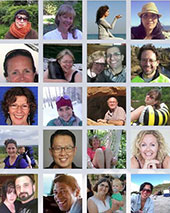
-
— October 24, 2016 —
Frequently Asked Questions (FAQ's)
Over the years, I've received many questions and/or concerns about the course, and I've just begun the task of putting the most common ones, and responses to them, on this new FAQ page. Some of the practice pages will have links to the FAQ page to answer questions specific to that practice. For instance, the Body Scan and Sitting Meditation pages now each have a section at the bottom with questions that often come up for that particular practice. The FAQ page is still in the process of being populated, and will be periodically updated.
-
— May 16, 2016 —
The Realm of Hungry Ghosts video by Tara Brach [20 min]
In this video, Tara makes the point that desire is natural, a part of existing in a dynamic and alive universe, but it is being "caught", "hooked", or being attached, that causes suffering. This was shown as part of the May 12 Graduate meeting about "Preferences vs. Demands". Also introduced at the graduate meeting was the story, The Terribly, Tragically, Sad Man, a beautiful parable about a man who learns how to love what he already has. (Just for fun, check out You Are Probably... in the Closing Thoughts section of the Graduate Meeting notes).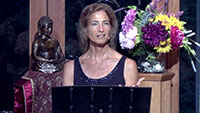
-
— March 1, 2016 —
Soften, Soothe, Allow [New meditation to course and new addition to Week 5]
Tara Brach's RAIN is a powerful process, but not everyone finds it natural or intuitive, and for that reason, we're now using Kristin Neff's Soften, Soothe, Allow in Week 5 as the informal practice to be used in dealing with difficult emotions. As a way of introducing it, we've also included a wonderful story about the origin of Soften, Soothe, Allow by Chris Germer, the co-founder, along with Kristin, of Mindful Self-Compassion. (NOTE: The RAIN process, including Tara's talk, the audio meditation, and a description of this latest RAIN are still available on Tara Brach's website.)
-
— February 26, 2016 —
Mindfulness-Based PAIN Management video by Vidyamala Burch [21 min]
This is an inspiring video in which Vidyamala Burch of Breathworks talks about her journey with the chronic pain and disability that began with an accident when she was a teenager, and in which she describes her novel approach to chronic pain. Jon Kabat-Zinn calls Vidyamala's approach "the most comprehensive, in-depth, scientifically up-to-date and user-friendly approach to learning the how of living with chronic pain and reclaiming one’s life that I know of." Also new is an edited version of a 2013 talk of Vidyamala's, only 10 minutes long, Turning Toward Difficulty. Both of these videos have been added to Week 5.
-
— February 12, 2016 —
The Rabbi's Gift [video narrated by M. Scott Peck]
The Rabbi's Gift is a beautiful story illustrating the transformative power of seeing the goodness in others (and ourselves). The video is narrated by M. Scott Peck himself. This, as well as a printable version of The Rabbi's Gift, has been added to Week 8 of the course.
-
— January 14, 2016 —
"Inner Listening" - Introduction to Focusing [January Graduate Meeting notes]
In Week 5, we introduce the counter-intuitive idea of turning toward, rather than away from, emotional difficulty (this is an idea that extends to physical difficulty, as well, as described in Week 5). The most sophisticated and complete method I know of for turning toward our inner landscape is Inner Relationship Focusing, as taught by Ann Weiser Cornell. Becoming completely comfortable and skilled with Focusing takes some time and work, and is beyond the scope of the MBSR course, or even the Graduate meetings, but for those who are interested, some introductory materials are provided here.
-
— January 13, 2016 —
The RAIN of Self-Compassion [a new version of "RAIN" by Tara Brach]
This new version of RAIN (Recognize, Allow, Investigate, Non-identify), which redefines the "N" as being "Nourish" was added to Week 5. RAIN has since been replaced by "Soften-Soothe-Allow" (see February 26 entry), but Tara's talk, the RAIN meditation, and a description of this latest RAIN are still available on Tara's website.
-
— January 10, 2016 —
The Most Frequently Asked Question [article by Sylvia Boorstein]
Anger is sometimes confused with hatred and identified as an emotion that a "spiritual" person would not have. In this article, which has been added to Week 6, Sylvia Boorstein clarifies this misunderstanding by recounting an experience with the Dalai Lama, who was asked if he ever got angry.
-
— December 25, 2015 —
The Sacred Art of Listening [article by Tara Brach]
Week 6 has been re-worked to have a greater emphasis on listening, and to that end, this article by Tara Brach has been added. Also, Week 1 now includes a new article, Why We Find it So Hard to Meditate, about some of the challenges of beginning a meditation practice, including the misconception that to do meditation "right", one must stop thoughts.
-
— December 14, 2015 —
The Three Components of Self-Compassion [6 min video]
Self-kindness may be the most important component of MBSR - it’s the oil that makes the gears of mindfulness work. Without it, the practices are dry at best, and harsh and counter-productive at worst. For that reason, I’ve added some key resources on self-compassion, all of them by Kristin Neff, the University of Texas psychologist who has made self-compassion and mindfulness her life’s work. Her video, The Three Components of Self-Compassion, has been added to Week 5, and another video of hers, Overcoming Objections to Self-Compassion has been added to Week 7, along with her article, The Five Myths of Self-Compassion. These resources clarify some common misconceptions about self-compassion, including the belief that being kinder to ourselves is somehow narcissistic, or that self-compassion makes us complacent and less effective. All of these were discussed in the December 2015 Graduate meeting.
-
— December 8, 2015 —
Ten Mindful Movements by Thich Nhat Hanh[14 min video]
A gentle sequence of movements that the monks and nuns of Plum Village use daily, demonstrated by Thich Nhat Hanh himself. This has been added as an option in Yoga, for those with physical limitations.
-
— November 22, 2015 —
Mindfulness and Chronic Pain video by Vidyamala Burch [24 min]
This video has been added to Week 5. In it, Vidyamala Burch describes a way of working with chronic pain that is powerful, but counterintuitive - moving toward pain, instead of away from it, but doing it softly and with self-kindness. Vidyamala has lived with chronic back pain her entire adult life, as a result of a car accident, multiple surgeries, and congenital spine weakness.
-
— November 21, 2015 —
How My Son Ruined My Life video by Selma & James Baraz [7 min]
This hilarious but poignant video about the power of gratitude has been added to Week 8. I got to meet James Baraz (the son and author of Awakening Joy) last month and I asked him if she really changed that much after the time he spent with her when she was 89, and he said the difference was night and day. His sister asked him afterwards, "What did you do to mom?!?" He said that at age 94, a day or two before she died, completely blind and almost totally deaf at that point, she said to him "I don’t know what I did to deserve such a wonderful life."
-
— October 24, 2015 —
Measuring Mindfulness video by Judson Brewer [7 min]
This has been added to Week 2. In this video, Judson Brewer, the director of research at UMass's Center for Mindfulness, correlates brain scan data with subjective experience during meditation. Also added to Week 2, in the Supplementary Materials section, is the full 20-minute video, Mindfulness, the Mind, and Addictive Behavior, in which Judson describes ways that mindfulness can be used to change addictive behavior.
-
— October 8, 2015 —
Mindful Meditation and the Brain video by Shauna Shapiro [6 min]
This has been added to Week 2. This very short video by Shauna Shapiro gives a great and compelling summary of how meditation creates measurable changes in the brain. In it, she also describes how research indicates that the "Happiness Set Point", which psychologists had previously thought did not change over our life-span, actually changes positively with meditation. This video replaces the 8-minute video, How Meditation Can Reshape Our Brains, by Harvard Researcher, Sara Lazar, which was moved to "Supplementary Materials".
-
— September 21, 2015 —
The Art of Being Heard video by Susan Piver [16 min]
This video by Susan Piver has been added to Week 6. In it, Susan describes four principles of mindful communication (timing, listening, agenda-less-ness, confidence). Her description of confidence may surprise you, especially given the fact that this particular presentation was given to a business audience.This replaces the 21-minute Marshall Rosenberg video, which was put in "Supplementary Materials".
-
— August 29, 2015 —
Mindfulness: Being Fully Awake in Our Own Lives video by UMass [10 min]
This video is a great introduction to mindfulness and has been added to the Introduction page. It's narrated by Saki Santorelli, director of the Center for Mindfulness at University of Massachusetts Medical School.
-
— August 22, 2015 —
How Meditation Can Reshape Our Brains video by Sara Lazar [8 min]
This video by Sara Lazar, shown at the August Graduate meeting was added to Week 2. Sara Lazar is a Harvard neuroscientist whose research shows how meditative practices, even when practiced for a relatively short time, create measurable changes in the brain.
-
— August 11, 2015 —
Managing Anxiety with Mindfulness video of Rachel Green [15 min]
This video of Rachel Green was added to Week 1. It was originally made to address anxiety, specifically test anxiety and panic attacks, but provides a great introduction to some of the basic components of mindfulness meditation, including mindful eating and breath meditation.
-
— August 1, 2015 —
Cultivating Altruism video by Matthieu Ricard [18 min]
This video by Matthieu Ricard, shown at the July Graduate meeting was added to Week 7. Ricard is a Buddhist monk and author who has logged over 50,000 hours of meditation and has worked both as a subject and collaborator in neuroscience research. Also added to the Week 7 videos was Jon Kabat-Zinn's Compassion and Mindfulness. These videos replace Mindfulness and Self-Compassion by Kristin Neff, which has been moved to Supplementary Materials.
-
— May 17, 2015 —
Attention, Intention, Attitude video by Shauna Shapiro [16 min]
This video explores the attitude we take toward ourselves in meditation, which is often harsh, and the possibility of being gentler with ourselves. It has been added to Week 3, and replaces "Letting Go" in Meditation, which has been moved to the Supplementary Materials section of Week 3.
-
— April 22, 2015 —
Map of Online Graduates
This shows cities with one or more graduates of the Online course to give graduates a sense of where their fellow graduates are.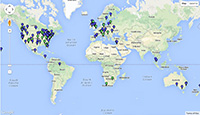
Map of Visitors
This shows the most recent 1000 visitors to the Palouse Mindfulness site. On average, the site receives about 2500 visitors a day.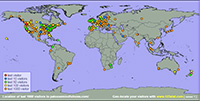
-
— April 11, 2015 —
Gallery of Learning
This new section of the site contains some of the "letters of learning" that graduates send when they complete the online MBSR course. It can be reached through the Welcome page.
-
— March 29, 2015 —
Joshua Bell plays a $3 Million violin (and almost nobody notices) by JJ Musgrove
This 4 min. video has been added to Week 2. It chronicles the "concert" Bell played at the Washington DC Metro station in 2007 and has some actual footage of him playing in the Metro. Also added to Week 2 is an interview of Joshua Bell by Diane Sawyer on PBS in which he talks about what he thought about the "concert".
Non-Striving by Jon Kabat-Zinn [3 min]
This short video is one of Jon Kabat-Zinn's "9 Attitudes of Mindfulness" and is a wonderful description of the importance of non-striving in mindfulness meditation (and life!). It has been added to the video offerings in Week 3.
-
— March 5, 2015 —
Closed captioning was added and/or corrected for all videos, with the exception of some that are in the "supplementary" sections. Accurate captions are critical for deaf or hard-of-hearing people (see The Importance of Captioning, an enlightening two minute video), but the importance of captioning goes even beyond this. It's very helpful for those whose native language is not English, as well as for the clarity it provides when the speech is fast, muddy, garbled or faint. [The captioning on this site was done with the help of Caption Access.]
[ Changes were made to the course between 2012 and 2015, but we didn't start showing them in What's New until March of 2015. ]
-
— December 5, 2012 —
The first version of Palouse Mindfulness was released to the world!
© 2015-2025 Palouse Mindfulness Inc.